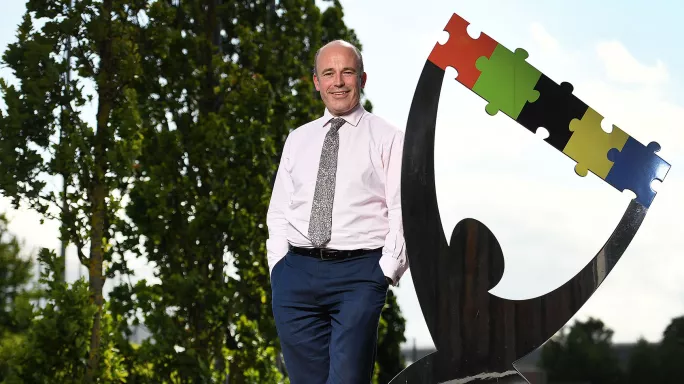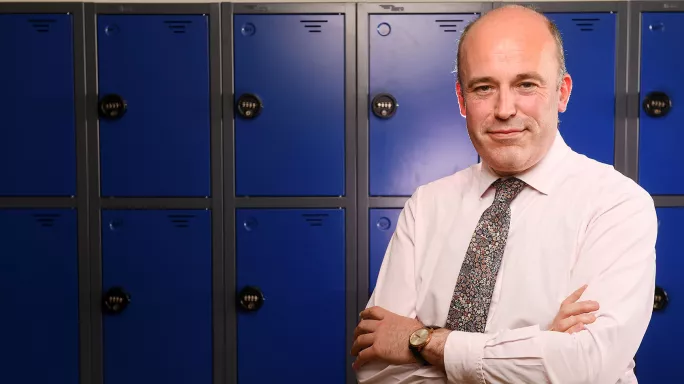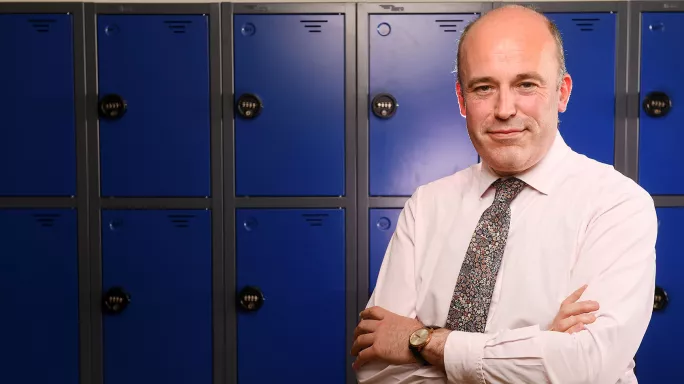- Home
- Meet the boss of England’s biggest academy trust
Meet the boss of England’s biggest academy trust

When United Learning this year became the largest multi-academy trust in England, it was a milestone that was unheralded and largely unnoticed - not least by its own chief executive.
After what the newly knighted Sir Jon Coles calls “the little burst of growth we’ve been having”, it overtook Academies Enterprise Trust as the biggest academy beast in the land.
“I don’t really track that but I’m told that that is the case,” he says. “In fact, I was told in the same week by both Sean Harford [Ofsted’s national director of education] and Dominic Herrington [the national schools commissioner] that we are the biggest.
“These are two people I trust, so if they say that, I’m sure it’s true.”
Luke Tryl: The ex-Tory adviser who wants Labour to love free schools
Carolyn Roberts: Chair of Ethical Leadership Commission for heads
Jo Saxton: The MAT CEO who thinks Angela Rayner is ‘so cool’
Coles may well be the insider’s insider in the education world: a knight of the realm who was a leading Department for Education civil servant for 15 years before taking the helm at an academy trust that traces its origins back to Victorian times.
But he is also a qualified teacher who says the thread that has run through his career is working out how to make the biggest difference to the most children.
‘I’ve never been cool, in any way’
Coles comes from a family where “education was the most important thing”.
“Growing up, nobody in my family had been to university, but my parents had a lot of belief in the importance of education.
“My mum actually did A levels and had a place to university but because of family circumstances - my grandfather had had a heart attack and they needed her to go and earn some money, basically - she never went to university.
“I think that was one of the things that gave her a really strong sense that she wanted her children to have an opportunity.”
At school, Coles had an unabashed thirst for knowledge - “I was the geek’s geek, definitely. I’ve never been cool, in any way” - reading the encyclopaedia for pleasure and securing a grammar school place.
He was aware at the time of what he saw as the inequity of the selective system.

“At primary school, some of my best friends didn’t pass the 11-plus”, he says, “and I was very conscious of how unfair that seemed, and how much our lives diverged at that point. That they didn’t have the opportunities that I then had.
“It’s hard not to be aware of that when effectively your friendship group splits, and within a couple of years you’ve suddenly got much, much less in common.”
‘We are not ideological’
Today, Coles’ office is in an anonymous-looking building next to a petrol station in Southwark, south London.
Inside, it is decorated with pupils’ artwork. Outside, the view is dominated by the UK’s tallest building, and Coles meets Tes in the aptly named Shard Room.
But although it is now the biggest academy trust in England, United Learning is not one of the best known.
It is not one of the usual suspects that inserts itself into the big education debates of the day, nor is it one of the few that are routinely held up as examples by ministers.
Neither has it been the subject of any high-profile academy scandals, although there have been local controversies about individual academy conversions.
In the latest MAT performance tables published by the DfE, United Learning is one of 23 trusts rated “above average” for its Progress 8 score in its secondary phase, but at primary it is rated “below average” for each of reading, writing and maths.
So what exactly is United Learning?
“We are not ideological” is how Coles prefaces his response. “My interest in life is making things better for children, and I’m not out to make a political point or argue for a particular philosophy, so we definitely don’t occupy the headlines for the sake of it.”
Its history dates back 135 years, when it was founded as a group of private schools to educate girls and young women. Today it is unusual in having a mix of private schools and state-funded academies.
Coles is quick to point out that the two groups of schools are kept separate in terms of their finances, but “in all other ways we trust to run the group as a single group”.
He outlines five “key principles” that all UL schools - whether state or private - embody: the best from everyone, powerful knowledge, education with character, leadership in every role, and continuous improvement.
They are principles that he says allows individual school leaders to lead locally.

“Yes, we see ourselves as having high standards and high expectations, but each of those principles we have fleshed out and is meaningful, and you could definitely say this school embodies this principle and that school doesn’t, but how they do it is a matter for leaders, and it isn’t a straitjacket. Our schools are different from one another.”
He summarises: “We are not the sort of trust that will say, ‘Right, you must do this because it’s our policy.’ That doesn’t seem a useful thing to do to me.”
Making the biggest difference to the most children
After reading maths at the University of Oxford, Coles studied for a PGCE at the University of Cambridge.
“I wanted to work in education because I thought working in education was the most important thing I could do,” is how he puts it.
“Back to personal values, but also from a societal perspective, I do think it is the thing that can make the biggest difference in the long run to the good and health of the society: a well-educated population, and a broadly educated population, across the whole of the population is a key to a good society.
“That was my motivation in training to teach, and I think has remained my motivation really throughout my career, to work in the way that I think makes the biggest difference to the most children.”
But although he qualified to be a teacher, he never actually worked as one.
Instead, he studied a masters degree in philosophy, and took a job at the National Audit Office (NAO). He wasn’t working in education, but education was still what motivated him.
“It just felt as though the system needed to change to make it more likely that more teachers succeed with more children, and I thought I could maybe make a contribution to that, which, one way or another, I have been trying to do ever since.”
At the time, the NAO was doing more work in education, but Coles says ruefully that “it was a terrible career move; it didn’t suit me at all”.
He came to a realisation: “I don’t really want to be a commentator or critic. I want to get into the arena and have a go at doing something.”
In 1997, he became a civil servant at what is now the DfE.
During his time there, he led work to deliver one of New Labour’s most emblematic pledges, to cap infant class sizes at 30, and played a key role in the London Challenge, which is often credited with helping to transform the capital’s schools.
But eventually, Coles had to decide where his future lay: in the civil service, where the career ladder would take him outside the DfE and towards a coveted permanent secretary position, or in education. He chose the latter.
In 2012, he joined United Learning, where “the sense you have made a difference to an identifiable group of children’s life chances was easier to see”.
There was also, Coles says, a feeling after the 2010 election that academy trusts “were going to be the future, really”.
‘They will carry on making that case forever’
According to the DfE website, United Learning currently has 63 academies, stretching from the south coast to Carlisle.
It is currently in the midst of a burst of growth that has seen it not only take on individual schools, but also swallow up smaller academy chains, such as the scandal-hit Silver Birch Academy Trust. This will see it grow to about 70 schools.
“When we’ve completed that, which will be in six months time probably, we’re going to have a little pause whilst we digest those,” Coles says.
Some of these transfers have been controversial, but Coles says: “It’s relatively easy to build trust with parents and staff because we are trustworthy people.
“Obviously it’s a completely different situation when a group of political campaigners have latched onto a school, and are drawing on national networks of anti-academy campaigners to try and make a case. It’s got nothing really to do with us.”

The latter is a reference to John Roan School in Greenwich, London, which is poised to join United Learning after being rated “inadequate” by Ofsted. A high-profile campaign is fighting the move.
When he attended a meeting at the school, he “expected to meet an extremely hostile group of parents”. Instead, Coles says, 90 per cent were fully supportive.
“But I don’t think there’s anything we can do to make the protests go away because I don’t think it’s ordinary parents feeling concerned about their children’s futures.
“I think it’s a group of political activists who are against the policy and are well networked across the country and put their opposition to the policy ahead of the interests of the school and will carry on making that case forever, as far as I am concerned.”
He is dismissive of those who argue multi-academy trusts damage the accountability of schools to their local communities.
He argues that the introduction of local management of schools in the 1980s had already put schools at arms-length from councils, leaving “a chimera of community involvement and democratic accountability around maintained schools”.
And for Coles, the real question is how a school, academy or not, actually acts.
“You should want to be responsive, accountable, engage well with councillors, involve parents in the governing body of the school, listen to the views of staff, introduce systems which make sure you hear what parents think and staff think and children think, make sure that leaders are wanting to respond and not be high-handed in their approach.”
In summary, “you can overstate the structural point, and understate the behavioural point”.
‘It was a very nice thing to happen’
When Coles did, unusually, make the news, it was when he received a knighthood in last month’s Queen’s Birthday Honours. But don’t expect him to be changing his Twitter handle to @SirJonColes anytime soon.
He seems mildly embarrassed to talk about the award, and a suggestion that he say something on the record about it for his Tes profile is met with an unenthusiastic: “Really?”
Despite that, for the record: “It was a very nice thing to happen. I mean, I’m hugely grateful for the opportunities I’ve had, both from my education and professionally.
“I have had opportunities to work with wonderful people and learn a huge amount from them and to contribute to things that are really important, so, on the whole, it’s enough to have had those opportunities and serve, and it’s incredibly nice to receive a very generous recognition of that.”
But he finishes with a thought that brings him back to the woman who did so much instil in him the importance of education: “My mum would have been proud.”
CV - Jon Coles
Education
1978-1983: Riverhead Infants and Amherst Junior Schools, Kent
1983-1990: Judd School, Kent
1990-1993: Mansfield College, Oxford (MA Mathematics, 1st Class)
1993-1994: St Catharine’s College, Cambridge PGCE
1994-1995: University of York (Masters in Philosophy)
Career
1995-1997: National Audit Office
1997-2012: Department for Education and Employment/Education and Skills/Children Schools and Families/Education (with a period in the Cabinet Office)
2012-present: United Learning, chief executive
Keep reading for just £1 per month
You've reached your limit of free articles this month. Subscribe for £1 per month for three months and get:
- Unlimited access to all Tes magazine content
- Exclusive subscriber-only stories
- Award-winning email newsletters



